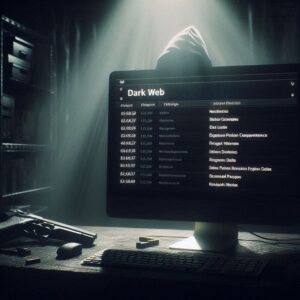Essential Strategies for Mastering Dark Web Investigations and Enhancing Cybersecurity Awareness
The Dark Web is a complex and often misunderstood segment of the internet, hidden from standard search engines and typical browsing practices. To access this clandestine network, users must employ specialized software and make specific configurations, which adds to its allure. This enigmatic digital space thrives on a high level of user anonymity and untraceability, creating an ideal environment for various illegal activities. While it is infamous for its connections to severe crimes, including drug trafficking, arms sales, and human trafficking, it also serves as a platform where cybercriminals trade stolen data and sensitive information. Within this shadowy environment, individuals can engage in unlawful transactions, join restricted forums, and network with communities that operate outside legal oversight, often feeling secure from law enforcement intervention.
In contrast to the conventional surface web, the Dark Web is intricately designed to safeguard users’ identities through advanced encryption technologies and multiple layers of anonymization. Most individuals access this hidden digital realm using specialized software like Tor (The Onion Router), which anonymizes online activities by routing internet traffic through a network of volunteer-operated servers. This sophisticated routing significantly complicates efforts by anyone trying to surveil network traffic, making it exceedingly difficult to trace a user’s location or online actions. Although the Dark Web provides a secure communication platform for whistleblowers and political dissidents, its notoriety primarily arises from its connections to illicit enterprises, creating considerable challenges for law enforcement agencies aiming to uphold order and security.
Proven Techniques for Safely Exploring the Dark Web with Confidence
- Understand that the Dark Web is a concealed part of the internet that necessitates specific software for access and is often associated with illegal activities.
- Be cognizant that exploring the Dark Web entails significant risks, including identity theft, financial fraud, and exposure to harmful or explicit material.
- DarkSearch is an invaluable tool, enabling users to navigate the Dark Web securely through its anonymous search engine capabilities.
- Prepare to encounter a diverse range of illegal products and services, including stolen data, black market activities, and even legitimate content while navigating the Dark Web.
- To guarantee a secure experience while exploring the Dark Web, employing a reliable VPN, exercising caution with links, and managing personal data sharing are essential best practices.
Identifying and Reducing Risks Linked to Dark Web Activities
The Dark Web poses significant risks not only for individual users but also for society at large. This hidden segment of the internet has become a central hub for criminal enterprises, including the rampant sale of narcotics, firearms, and stolen personal information, which bolster various criminal organizations globally. The perilous nature of this environment heightens the likelihood of identity theft, financial fraud, and other cybercrimes, potentially causing havoc in the lives of unsuspecting users. The anonymity provided by the Dark Web complicates law enforcement’s efforts to monitor and apprehend offenders, granting cybercriminals a misleading sense of security as they engage in illegal activities.
Furthermore, the Dark Web plays a disturbing role in facilitating human trafficking and exploitation. Its unregulated and anonymous nature creates a sanctuary for traffickers, contributing to a troubling rise in online exploitation of vulnerable groups, especially young individuals who may be coerced into sex work or other forms of modern slavery. Additionally, the Dark Web often acts as a breeding ground for extremist ideologies and terrorist propaganda, posing significant threats to national security and public safety. This reality underlines the urgent need for ongoing vigilance and proactive measures from society to combat these profound dangers.
The widespread presence of illicit content and activities on the Dark Web carries significant societal consequences. It nurtures a culture of lawlessness that undermines efforts to establish a safe online ecosystem. Therefore, it is crucial for users to remain aware of the inherent risks associated with the Dark Web and take proactive steps to protect themselves from its potentially harmful repercussions.

Expert Recommendations for Safe Dark Web Exploration with DarkSearch
DarkSearch is a cutting-edge search engine specifically designed to empower users to navigate the Dark Web securely and privately. This advanced tool allows individuals to search for specific content while preserving their anonymity and personal privacy. DarkSearch utilizes robust encryption and privacy protocols, ensuring users can explore the Dark Web without the persistent threat of being tracked or monitored by malicious actors.
One of DarkSearch’s key features is its ability to provide users with a curated list of verified and trustworthy Dark Web websites. This functionality is vital for helping users avoid illegal or harmful content, directing them instead toward reputable resources and valuable information. Additionally, DarkSearch incorporates built-in security measures designed to protect users from fraudulent sites and phishing attacks, significantly reducing the risk of falling victim to cybercrime during their browsing experience.
Beyond bolstering security, DarkSearch opens up a treasure trove of information and resources that are often inaccessible on the surface web. This includes niche forums, marketplaces, and communities dedicated to a variety of interests, allowing users to connect with like-minded individuals in a secure and private environment. By leveraging DarkSearch’s capabilities, users can responsibly navigate the Dark Web, avoiding the pitfalls of illegal activities while still gaining access to valuable insights and information.

Exploring the Diverse Content Landscape of the Dark Web
The Dark Web features a vast and varied array of content that encompasses both legitimate and illicit activities. Its infamous reputation primarily arises from its function as a marketplace for illegal goods and services, including the sale of drugs, firearms, counterfeit currencies, and stolen personal data. This secretive environment is particularly alluring to criminals wishing to conduct transactions with minimal risk of detection by law enforcement.
Beyond these illegal exchanges, the Dark Web also hosts forums and groups that engage in a myriad of discussions, including hacking, cybercrime, political activism, and whistleblowing. These platforms offer individuals a secure space to engage in controversial dialogue and share information without fear of censorship or surveillance. However, they can also become breeding grounds for criminal behavior and extremist ideologies, presenting significant threats to public safety and national security.
Despite its associations with unlawful activities, the Dark Web plays critical functions. It provides a secure environment for whistleblowers and activists to disseminate important information and raise awareness about issues such as corruption and human rights abuses without fear of retribution. Furthermore, the Dark Web houses a wealth of resources and information that may be censored or unavailable on the surface web, making it an invaluable resource for those seeking uncensored knowledge and alternative perspectives.
Crucial Safety Protocols for Effective Dark Web Navigation
While venturing into the Dark Web exposes users to numerous risks, various strategies can bolster protection against potential dangers. Utilizing specialized software like Tor enables secure browsing of the Dark Web, as it encrypts internet traffic, concealing users’ locations and online activities from potential surveillance or traffic analysis, thus providing a greater sense of privacy.
Practicing caution is paramount during any Dark Web exploration. It’s essential to avoid clicking on unknown links or downloading unexpected files, as the Dark Web contains many malicious sites aimed at stealing sensitive information or infecting users’ devices with malware. Users can enhance their security by limiting their visits to trusted and verified websites while navigating this hidden digital landscape.
Moreover, individuals should refrain from sharing personal information or engaging in transactions on the Dark Web. The inherent anonymity of this environment complicates the verification of the legitimacy of merchants or buyers, significantly increasing the risk of scams and fraud.
Employing a virtual private network (VPN) can greatly reinforce security while navigating the Dark Web, as a VPN encrypts internet traffic and masks IP addresses, making it more difficult for malicious entities to trace or monitor online activities.
By adhering to these safety protocols and maintaining vigilance during Dark Web explorations, users can significantly reduce their exposure to potential threats and safeguard themselves from the dangers associated with cybercrime.
Legal and Ethical Considerations for Responsible Dark Web Usage
When utilizing DarkSearch or engaging with the Dark Web, individuals must remain acutely aware of the legal and ethical implications that accompany this exploration. Accessing certain types of content or engaging in specific activities on the Dark Web may infringe upon local laws or ethical standards, potentially leading to severe legal consequences or moral dilemmas.
A pivotal legal consideration when using DarkSearch is the risk of encountering unlawful content or activities. Users must understand that accessing illegal marketplaces or participating in criminal actions on the Dark Web can result in significant legal repercussions, including prosecution or imprisonment. Therefore, exercising caution and adhering to local laws during Dark Web exploration is imperative to avoid unintentional violations.
Equally important is grasping the ethical implications associated with using DarkSearch. Users should be mindful of the dangers of engaging with harmful content or facilitating illegal activities on the Dark Web. This includes refraining from transactions involving illicit goods or services, steering clear of criminal enterprises, and promptly reporting any illegal activities that may arise during their exploration.
When accessing sensitive information or discussing controversial subjects on the Dark Web, it is vital to acknowledge the moral implications at play. Approaching such topics with care and empathy is crucial, as it recognizes the potential impact on individuals or communities affected by these issues.
By remaining vigilant and considering the legal and ethical factors while using DarkSearch, individuals can navigate the Dark Web in a responsible and safe manner.

Anticipating Emerging Trends in the Dark Web: Innovations and Their Future Implications
The continuously evolving landscape of the Dark Web is poised for significant advancements and implications that could dramatically reshape its future trajectory. As technology continues to progress, concerns about the potential for increasingly sophisticated cybercriminal activities flourishing within the Dark Web are escalating. Innovations in encryption techniques, anonymization technologies, and decentralized networks may further complicate law enforcement’s ability to monitor and regulate illegal activities in this concealed environment.
Moreover, the significance of international collaboration in tackling the challenges posed by the Dark Web cannot be overstated. Given that illicit operations on the Dark Web frequently transcend national boundaries, the need for cooperative actions among governments, law enforcement agencies, and technology firms is critically important. This cooperation includes sharing intelligence, coordinating efforts, and establishing regulatory frameworks to mitigate the risks associated with the Dark Web, highlighting the crucial roles played by each entity in addressing this global issue.
Additionally, ongoing discussions surrounding potential government interventions aimed at countering unlawful activities on the Dark Web while safeguarding individual privacy rights are gaining traction. Striking a balance between addressing cybercrime and protecting freedom of expression and internet privacy presents a complex challenge. As policymakers navigate these intricate considerations, they must prioritize informed decision-making to ensure that legislative measures effectively combat illegal activities on the Dark Web without infringing upon individual rights.
Future developments in the Dark Web will have profound implications for cybersecurity, law enforcement, personal privacy rights, and global security. By staying informed about potential trends and changes, individuals can better understand the evolving landscape of the Dark Web and take proactive measures to protect themselves from its associated threats.
Comprehensive Insights into Frequently Asked Questions About the Dark Web
What characterizes a Dark Web search engine and how does it function?
A Dark Web search engine is specifically designed to assist users in navigating the Dark Web, a hidden segment of the internet that is not indexed by conventional search engines. This tool empowers individuals to discover and access concealed websites and exclusive content that is typically unreachable through standard web browsers, enriching their exploration experience.
What methods do dark web search engines employ to operate?
Dark web search engines utilize specialized algorithms to crawl and index content located within the hidden corners of the Dark Web. These engines access concealed websites and extract information, making it searchable for users who wish to explore this hidden digital landscape more effectively and efficiently.
Is the utilization of a dark web search engine legal?
Using a dark web search engine is not inherently illegal, as it serves merely as a tool for accessing content on the Dark Web. However, users must recognize that the Dark Web is often linked to illegal activities, and engaging with certain content or participating in unlawful actions may violate the law.
What risks should I be aware of when utilizing a dark web search engine?
Several risks accompany the use of dark web search engines, including exposure to illegal and harmful content, potential malware attacks, and the threat of being targeted by cybercriminals. Exercising caution and implementing appropriate security measures is essential when accessing the Dark Web to mitigate these risks.
Can I access the Dark Web without relying on a dark web search engine?
In theory, it is possible to access the Dark Web without a search engine by using specialized software like Tor, which facilitates anonymous browsing and navigation to hidden websites. However, employing a dark web search engine can simplify the process of locating specific content and enhance navigation through the Dark Web.
References:
Pros and Cons of Internet Usage – Good and Bad Effects. https://thetechprint.com/pros-and-cons-of-internet-usage
Is it Illegal to Access the Dark Web? – Exploring the Dark Corners of the Digital World: A Tale of Mexican Hackers. https://www.hackersmexicanos.com/is-it-illegal-to-access-the-dark-web/
The post Deep Search: Unveiling the Invisible Dark Web appeared first on Ezi Gold.
The Article: Dark Web Exploration: Discovering the Hidden Internet Depths Was Found On https://ai.ezi.gold
The Article Dark Web Exploration: Unveiling the Hidden Internet Secrets Was Found On https://limitsofstrategy.com
The Article Dark Web Exploration: Discovering the Internet’s Hidden Secrets First Appeared ON
: https://ad4sc.com


Comments are closed